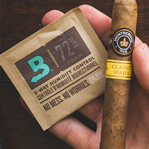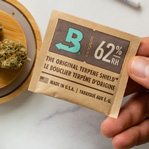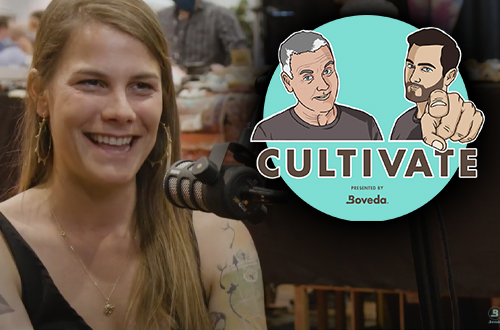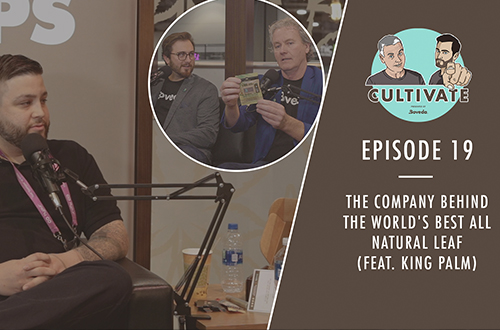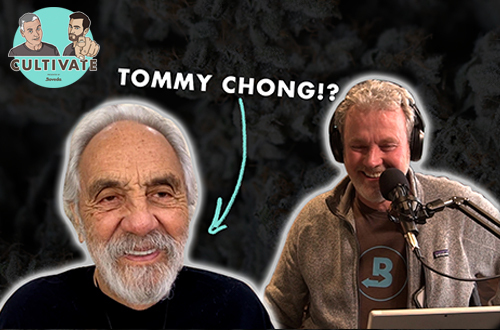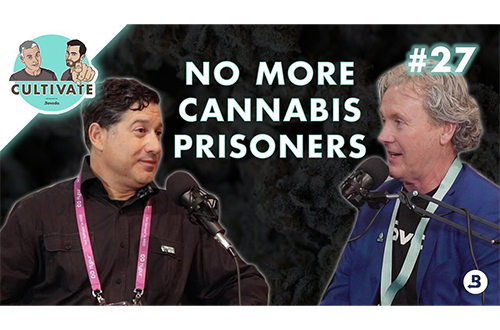Read Full Interview: Video Transcript
Drew Emmer (DE): Welcome to another episode of Cultivate. This is a show about you and your journey in the cannabis industry. It’s moving fast, but there’s room for everyone. Buckle up as we bring you the people and the technology that are blazing the trail. I was doing my homework. I must have watched 20 hours of interviews. I went through your whole deal. I’m really humbled, man. Looking at your career and what you’ve done and I just made a little list. You’re Canadian, a musician, a comedian, an actor, a writer, a director, an American, an inmate, an activist, a cancer survivor twice, a father, a husband, went through all of that. That was covered, like Larry King’s talking about it. Joe Rogan’s talking about it. Howard Stern’s talking about it and I’m humbled, man. I’m sitting here talking to you and-
Tommy Chong (TC): Well, thank you.
DE: … it really means a lot. I want to thank you for joining us today and I’m humbled by you being with us. But the thing that I picked up in all that stuff that I watched, going through the 35 or so films that are in your filmography, the 20 plus TV shows, the video game, all those interviews, the Grammy, the Grammy nominations, all that, you’re kind of trippy because when you listen to people, recount your career to you, you’re not really all that impressed.
TC: No.
DE: You’re most excited about being a comedian.
TC: Yeah. When you’re a comedian, you’re killing two birds with one stone in as much as you get to use the audience as your therapist. Comedians, we need our audience because we get a chance to explore and explore different mindsets, different ideas and then you see what resonates. The great thing about comedy itself, comedy, no matter what the subject is, there has to be a ring of truth to it. That’s what happens when you go to a therapist, like if you got mental problems or you got marital problems and so you go to a therapist and really what the therapist does is listen. That’s what they do and react and give advice when they can. But most of all, I’ve been a few therapists, sessions and then watch them on TV, like the Sopranos and really, all they do is they’re the audience.
TC: So I think that was my way of doing when I found out that I could do comedy, when I could not only do it, but love it because basically, I was the second oldest. My brother was three years older than me and we grew of kind of country style. Country style is your older brother uses the younger brothers as fodder and targets. They’d try different wrestling holds or punches and they’d try it on the little brother. So I’ve always been kind of shy and even I always needed a partner, whatever I did. Even when I did music, I was never the lead guitar player, not really.
TC: Maybe, in some ways, I was the only guitar player, but I never felt like a lead. Then years went by and I ended up having to learn how to do everything, not just play backup, but I had to learn how to play lead. I had to learn how to sing. It wasn’t until I got with Motown and Bobby Taylor that Bobby, he was lead singer and his attitude, and the whole Black culture, that’s what I learned is that, “You can do it. Come on, man. You can do it,” because you had to do it because in that culture, you had to speak up. You had to do to move your feet or you’d die and so I learned. I learned a lot of things, but being a comedian really gave me the confidence to do everything.
DE: So when you talk about being shy, were you nervous? Were you nervous when you get up on stage? When you went to perform, were you nervous or was it like-
TC: Yeah, it’s all of that. When you grew up in the kind of culture I did, in the ’50s, actually ’40s and then, the ’50s. It was, especially in the country, whatever identified you was your weakness, especially if you were poor and it’s the survival of the fittest. So you either had to learn how to run real fast to get home or you had to stand and take it or fight. My brother, he loved to fight, so he was good. But he got his licks. He took his licks, but he never gave up. He was more of a jock than I was. I was kind of lucky. I spent the first couple of years of my life, either in the hospital in a orphanage, like a home.
TC: So I never really developed my legs like I should’ve and so, at that young age. So I never really got to be the athlete that my brother was. My brother was a really good athlete. He’s wasn’t that tall, but he was mean and tough and strong. He passed away a couple of years ago, but he was my rock actually, all through school, all the schools, because we were a mixed-race kids in Calgary in the ’50s. That was an excuse to either get picked on or to be afraid of.
When Did Tommy Realize He Had Comedic Talent?
DE: So I know why you played the guitar and why you got into music. At least from previous interviews, I watched you, it was about getting girls or attention from girls that was at least one of the side benefits. What was it that got you hooked on comedy? Was there a comedian or was there an experience that you remember? Did you know you were funny?
TC: I love to laugh. I love to laugh. It was one of my things, even when I was a little guy, I just remember my mother was a great storyteller and so she would remind us of different things. No, I love to laugh and I always had a friend that made me laugh. I always had a friend, because that’s what you have when you’re poor. You count your wealth in how many friends you have and all you need is one. All you need is one best friend. Your best friend can be whoever pays attention to you. But with me, what got me into comedy seriously was that as I progressed musically, first of all, I was a country player.
TC: One thing I learned, all musicians are comedians and I’m talking about classical musicians. You talk to anybody that what happens when you learn music, you’re learning truth. You see, you can’t play your instrument unless it’s in tune and what in tune is, is that you hit a note and you get the vibration till it’s perfect or near perfect. So what happens with musicians is that we learn truth right from the beginning. If the band’s out of tune, that’s in tune. If someone says something off color or wrong, that’s out of tune, if someone says something brilliant and that’s why a lot of musicians are critically intelligent, the scientists and the dot commerce and that.
TC: You’ll find so many of them are musicians because you have that ability, that natural ability. So my connection with music or with comedy, it came with the music. Then I found out that so many musicians, especially jazz musicians are the funniest, the best comedians. So like Willie Nelson, for instance, very few people know what a great comedian he is. He not only could tell a joke, he clocks them, because like music, comedy’s all about timing.
DE: He’s got great timing.
TC: Incredible timing. So when you’d apply that to just an everyday thing, oh musicians, the best, the best.
Tommy’s Humble Upbringings Begat Future Fame
DE: I got a bunch of questions and we’re not going to have enough time to cover them all, but well, I love listening to you. You talk about your upbringing and you talk about the Spartan nature of it, being poor and working hard and all that, but there isn’t even a hint of resentment or negativity about that. It’s like you’re just reflecting on it as though it was so matter of fact. You’re not sore about your-
TC: Oh, no.
DE: … upbringing. Then my question where I was going with this, and I guess it’s kind of jumping a long way ahead, when did you notice or when did you realize that this was going places? I used to manage bands and fell in love with lead singers in bands and did the music scene for a long time. Musicians have a whimsical attitude about everything and they kind of go with the flow and it’s super fun and all that. But at some point in this process, you realized, or you had a chance to notice, “We got something here.” Did you have a moment like that where you thought, “We’re really onto something?”
TC: To be honest with you, and I’ve said this many times, in a lot of ways, it’s the topic of conversation. We’re all unique people, creatures, humans. We’re very, very unique and we’re very special. Growing up, I was told by my mother and it sunk in that, “You’re very special because of who you are and who your dad is and who your mom is. People are going to look at you and so you got to know that you’re going to be watched. So it’s up to you how you [inaudible 00:12:45] yourself,” And that stuck. But more than anything, and I tell this all the time, and I don’t know, the reaction I get is kind of funny. Because we were poor, and when you live in the country, there’s no television.
TC: At the time, television wasn’t happening. We had a radio. It was one station and there wasn’t recreation time. You went from survival to sleep and then you’re back to surviving and then you’re trying to put school in in the meantime. But so the only entertainment was church. It was free. Not only free, but they would give you a Bible if you attended Sunday School for a consecutive few days in a row. So I got into Sunday School and I got into it so much, the Jesus stories. So I got into it so much that it became my life, kind of. It was a thing I looked forward to and the stories about Jesus and the Apostles and all that, it just resonated in my head. But one time, I remember being in church and the minister or the preacher said, “God is all around you.”
TC: I remember walking home and I’m saying, “Okay,” to myself. I said, “Where’s God? Where’s God?” I was looking around, looking for God. In my mind, in a kid’s mind you think, “Is He standing and watching me?” Because they always say, “Just a closer walk with thee.” So I had this feeling, looking for God. I swear, because I remember this so clearly, I felt something and then I looked up in the sky. It was at night, and this is the country and this is in Calgary. I looked up at the sky and it was a clearest, sparkling night. You could see the Milky Way. You could see comets. When I asked, “Where is God?” And all of a sudden, my gaze went up to the sky and the Milky Way was right there.
TC: It couldn’t be any clearer because there was no city lights. It was the country, because it was the middle of a field. All of a sudden, the moon and the stars, the Milky Way, it was so bright, you could see shadows on the snow, on the ground. But I look up at the sky and I saw the heavens and it didn’t connect then. It didn’t connect, really, until I started talking about it and going over it in my mind about my relationship with God. I looked up and I realized, I asked that question, “Where is God?” And I got the answer. Then, I guess I was eight, I was eight years old, it was summertime, my brother and I, we’re walking. We looked like Tom Sawyer, barefoot and on a dusty road.
TC: All of sudden, a car pulls up and it was full of church people, young guys. They said, “Hey, you guys want to go to summer camp?” And we said, “Yeah, we do. Where’s it at and what is that? They said, “Well, hop in and we’ll go to your house and get your mother’s permission and have her sign.” So they did and we went to summer camp and it was Bible camp. That’s where I learned show business because they had little huts for everybody and the first thing they did that night we got there was teach you how to pray. When you learn how to pray, seriously, everything good starts happening because that’s the promise. The Bible itself, it’s really a book of instructions.
TC: You know how you buy something, like I bought just a drill press and I got to put the drill press together. So you get the book of instructions and it tells you the steps that you got to do in order to put this drill press together. Well, the Bible is basically a book of how to live your life. It has stories in there that if you go down this road, this is what’ll happen. If you go down this road, this is what’ll happen. But if you go down this road, then all the good things will happen, but you have to follow the book of instructions because when I went to prison, it was like going to camp. I was back in camp.
TC: So I turned the whole prison experience into a religious retreat. Now I’m older and now I’m reading books of like Emmett Fox or Joel Goldsmith. Again, it was a jazz musician that turned me on to the metaphysical world, a guitar player, Sonny, Sonny Greenwich, from Montreal. He turned me on to a book called The Third Eye. Now The Third Eye, it’s about a reincarnated Tibetan monk who comes back as an Englishman. It’s a true story. T. Lobsang Rampa was his name and he was from England. What he did, he wrote a book, it’s The Third Eye if you want to check it out.
DE: I’m writing it down.
TC: It tells you why we’re here, the incarnation, the whole thing the silver cord attaches us to our other self. Our other self, God is the almighty, but we have other selves looking after us and other people that are on the planet too. We’re all connected and we’re connected with the silver cord and the silver cord is that cord that goes to your other self. When you die, when you’re finished your term here, you go through that silver cord, back to the source. Then, you get another assignment and you come back and you’re born again and you start all over again and this goes on for eternity. So I learned all these things. As I learned, oh, I got to tell you this one. First of all, I’m telling you this because you asked. That’s it.
TC: I’m just telling you what I learned. I’d read T. Lobsang Rampa in The Third Eye, read that and loved it. Then I got turned on to Catherine Winder, I read her, loved her. She was like, “You can have whatever you want and if you can visualize it.” I was in New York and I was bodybuilding then. Cheech and I, we were happening. It was during the Cheech and Chong years. I’m walking down 42nd Avenue somewhere and I’m just walking to the gym, Mid-city Gym. I got my gym bag and walking along, all of a sudden, I turned. I didn’t mean to, but I turned and I’m standing outside HarperCollins Publishing. I look up, it’s Harper Collins. That was the publishers that publish different books that I’d read, so I knew who they were.
TC: Then I walked in and I felt like somebody was pushing me and I walked through the door and I walked in. Then, I literally was led right over to the section and then I felt something pull my arm down and pick up a book, just like that. I didn’t know what the book was and I picked it up and looked at it and it was a biography of Joel Goldsmith. Write that down, Joel S. Goldsmith. They’re all online. I looked at this book. It was a biography. I put it in my bag and went up and paid for it and went to the gym, worked out and come back and read the book. It changed my life. It changed my life. Again, you got to read it, Joel S. Goldsmith. Just briefly, he’s a Jewish guy in New York that was a businessman and he had the same kind of calling I had. He started going to Christian Science meetings and the next thing you know, he’s a reader for Christian Science then he became a healer. But read his book. Read his book-
DE: No, I love it, man. That’s awesome. So you talk about Goldsmith being a businessman, and I’m going to take a second because I want to do this. I got this in the mail. This might look familiar to you, it might not. I don’t know how much of the Tommy Chong product you actually end up seeing out in the world. I got a box in the mail. I bought some of this last week when I knew I was really excited to have the opportunity to talk to you. I got turned on to CBD a few years ago. I helped Boveda at cannabis shows. So I go to all these shows and people are, they’re hocking their wares. There was this really wonderful gal, Christie, that was working for Elixinol. At the end of the show, she said, “Hey, if you want to try this, I can give it to you at a discount.” So I started trying CBD. So when I saw that you had a CBD line, I ordered some and I want to take a second and just talk about it. It’s all very well-packaged. You should be happy with that.
TC: Yeah. I’m very happy.
DE: This is Good Vibes. Just Good Vibes, no jitters, no crash CBD. You’ll recognized that one.
TC: That’s the upper.
DE: That’s the daytime one?
TC: Yep. Yeah. It’s [crosstalk 00:24:36] orange [crosstalk 00:24:37]
DE: This must be the nighttime one.
TC: And the Nice Dreams.
The Acting Experience…
DE: Nice Dreams. We were just talking about Nice Dreams. Oh, and I got to forget, I got another commercial. This is hilarious. I’m walking around today. Everybody in the office is saying, “Are you really talking to Tommy Chong today?” I said, “I think I am if he shows up.” Jean-Paul was very kind to connect us. So Mike Anderson, who’s our logistics coordinator says, “Yo, yo.” I feel like Chris Farley is saying this to you. He says, Yo, yo. if you get a chance to ask Tommy Chong a question before you get started or afterwards, or right in the middle of the show,” as the case may be right now, “can you ask him about acting in the movie Color Out of Space or at least just say I loved him in it? Ha ha.”
TC: Again, everything that happens to me is freaky, it’s ordained. Color Out of Space, I get a call from Stanley, the director. He was a recluse. He’s from South Africa and then he ended up in England and he ended up hanging out with a horror movie guy and became one of these guys that did these great horror movies with a message. Again, there was a part in the Color Out of Space for me, that he insisted that I’m the only guy that could do it.
TC: It was about a hermit that lived in a shack behind a mansion and he had the psychic power, but he smoked a lot of weed and he drank a lot of coffee and he had his little hut. So I went over to Portugal and we shot that movie over there and it was crazy. You know what was real freaky about it, Color Out of Space as is about a virus that comes from the meteorites and eventually, it starts killing people. Everything it touches, it kills. It was killing people. This was exactly a year in March before the virus hit America in March.
DE: That is trippy.
TC: You talk about freaky, because that will end up as the last thing I did. I’m there and Nick Cage is in it. He plays the [inaudible 00:27:31] and unfortunately, I never had any scenes with Nick, but he is a buddy. I’ve met Nick. I hung out with Nick one time, but I’m not a horror movie guy at all. My daughter has done a couple precious and she sent me the script. I can’t even read the script because I have dreams and I don’t want to have those kind of scary dreams. I don’t like being scared. So the Color Out of Space opened and they had to do makeup and everything. The way I do acting now, I do like Marlon Brando used to do, I put up your piece on and they read me the dialogue.
TC: That way I don’t have to memorize anything, but it’s just in my thought. So I did the whole movie with an earpiece and the director, and he was the director/writer kind of thing. So he gave me the lines to say and everything else. Then when I’d get the gist of what’s going on, then I could do my part. But you knew that I had the earpiece. No one knew and I’m a big blurt it out. I’ll tell everybody all the secrets that I can, but it was freaky. A virus had just went around the world, killing everybody.
DE: That is trippy.
TC: Yeah.
DE: That’s really weird. So here’s what’s surprising to me. I just love talking to you. I could listen to you all day. I know you can’t stay all day, but I’m kind of surprised. We were 52 or 53 minutes into the conversation before the word cannabis came up or weed, because everybody just assumes you’re going to talk about the plant. We went down some paths that I didn’t expect at all. The stories that you told about going to Bible camp and the stage experience and the feelings that you got, what a great conversation. I could listen to you all day, man.
TC: I’m glad. Well, thank you.
DE: Thank you so much, Tommy Chong. You’re listening to Tommy Chong. He’s a guest today. Amazingly, he’s on the Boveda Cultivate podcast. I’m super grateful for your time, sir. I really want to thank you. Just thank you.
“Cannabis is a Gift…”
TC: One last thing, because we never talked about cannabis. Cannabis is a gift from God, literally. It’s in the Bible. Moses talked to the Burning Bush. That’s the Burning Bush he was talking to. It was a cannabis plant because we have receptors and probably every psyche or mystique on the planet has had something to do with cannabis somewhere along its evolution. If they didn’t, then it’s waiting for them because cannabis, for me, because again, because I was blessed since birth. Then all of a sudden, the cannabis comes into my life.
TC: Can you imagine that, an angel by the name of this Chinese guy, Eddie Ma, showed up with a joint and a Lenny Bruce record? Now you told me, I had never heard of Lenny Bruce until he’d given me the Lenny Bruce record and a joint at the same time. What did I do? The first thing I did Monday morning was quit school because I knew I was wasting everybody’s time. The second thing I did, man, was listen to Lenny and smoke that joint and put it out and light it up and smoke it and that’s how I did.
TC: One more thing, I’ll tell you. I had did another podcast and I had to tell this story because she said, “Did you always know that you were going to be famous?” I said, “You know, I did. I didn’t know consciously, but something inside of me did because once we’d played a gig in England and we were with Chris Clark and then we had a little gig on the side at a little club called the Speakeasy and we’re playing there and Jimi Hendrix walks in. He walks right up to the stage and he says hello to me, “Hey, Tom. How you doing, man. Hey, you mind if I [inaudible 00:32:39] Apparently, we found out later that Jimi was a big fan of the band and so I took off my guitar and I handed it to him.
TC: He goes, “No, no. I’ll play bass.” So Jimi played bass. I played rhythm guitar and Eddie Patterson played lead guitar and we played. Oh, we had a great night. Next day, we were driving to the airport in the Beatles’ limousine and everybody’s thinking about Jimi Hendrix, Jimi Hendrix, Jimi Hendrix. For some reason, I said, “I’m going to be bigger than Jimi Hendrix one day.” Everybody got really quiet and they looked at me because I’m basically shy. I don’t talk that much, but I said it at that time. Everybody looked at me and then the drummer says, “What? Playing a guitar?” because he knew how limited I was. I said, “No, not necessarily a guitar.” But I said, “One day,” and here we are.
DE: Dude, it’s fun to have a conversation with Tommy Chong and look into the camera and say, “Dude.” Really a treat to be with you, sir. Thank you so much.
TC: Thank you, man. Take care.
The Icon Himself Shares His Story
With a career spanning nearly six decades, Tommy Chong is a true legend. But the iconic Canadian-American comedian is so much more than a hero among the cannabis community—he is also a father, husband, musician, cancer survivor, activist, writer, a former prisoner and Grammy-award winner. His rise from humble beginnings in rural Alberta to becoming one of the most recognizable faces in Hollywood is a journey filled with both humor and heart.
“I’m only telling you this because you asked.”
In this episode of Cultivate, host Drew Emmer hears all about Chong’s incredible life from the man himself. From the first moment he was bit by the entertainment bug to a wild ride with a rock and roll idol to the books that have inspired him, Chong unveils a deeply personal glimpse into his past. A passion for the cannabis plant is indeed a major part of the icon’s personal ethos, but what else you discover may surprise you.
In this episode of Cultivate, you’ll learn:
- What led a young Tommy Chong to let down his guard and explore show business (1:45)
- The ways in which comedy and music intersect. Did you know Willie Nelson is a real joker? (7:43)
- How Tommy Chong ended up jamming with Jimi Hendrix—and how it influenced his desire to become the next big thing (30:14)
This all-encompassing interview will change the way you think about one of the most notable names in cannabis. Take a deep dive into an awe-inspiring lifetime of creativity and compassion on this episode of Cultivate.
You might also like:
Flower & Fitness vs. Opioids & Dependency: A Marine’s Fight
I Took The Boveda Challenge and Here’s What I Learned About Cannabis
